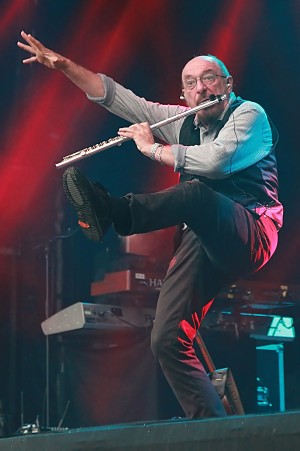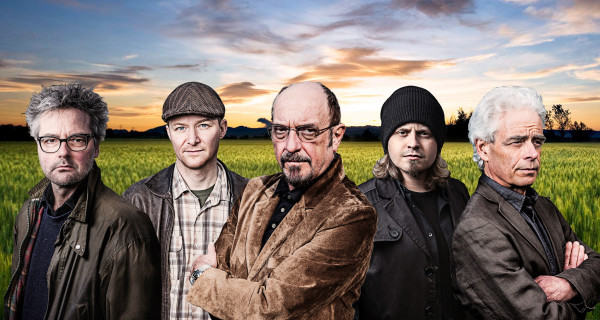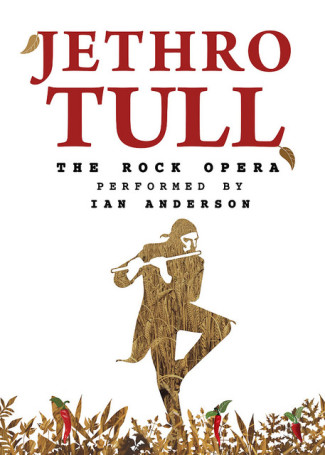INTERVIEW: Ian Anderson reimagines story of Jethro Tull

Ian Anderson, the legendary rock ‘n’ roller behind the influential band Jethro Tull, has a few changes in store for his string of North American concert dates this fall. Although he’ll definitely play the Tull classics — “Living in the Past” and “Locomotive Breath” are likely additions — the concert experience will be fashioned into a rock opera, telling the story of the original Jethro Tull, an English agricultural inventor who gave the band its namesake.
“Well, I was traveling through Europe last summer and sitting in the back of a car, and I had an Internet connection,” Anderson said recently during a phone interview. “So I amused myself by going online and learning a little bit about the life and times of the original Jethro Tull, because over the years I’ve really avoided knowing too much about him, as of a bit of embarrassment at being named by our agent after a dead guy when I obviously hadn’t been paying attention in history class at school and didn’t know about the original Jethro Tull back in 1968. So when I started reading stuff about him, I was immediately struck by many elements of the details of his life, and times that conjured up songs that I had written. And it was also made more poignant by the fact that I was at the time driving through fields of various crops in northern Italy, and as indeed Jethro Tull traveled to learn about European farming methodology in order to write about and try to put some of those practices to work on his own farm back in England.”
Anderson said the original Tull suffered from pulmonary diseases, and that’s why he found himself in that part of Europe, trying to gain a bit of rest and relaxation. A quote from the real Tull concerning his invention of the seed drill included something like, “When I was young, music was my passion.” Interestingly, and coincidentally, the band’s song “Windup,” which Anderson wrote in 1971 for the Aqualung album, begins with a similar passage.

“I can set many of the best known Jethro Tull songs into the storyline, into the narrative of Jethro Tull’s life,” Anderson said. “But rather than make it merely a historical piece, it would be more fun to set it in the present or near future and have my Jethro Tull be a pioneering biochemist working on cloning, and GM foods and patented technologies to help feed the world in the context of big agribusiness, which, of course, brings about with it lots of ethical and moral dilemmas about making tons of money out of providing necessary foodstuffs for an ever hungry and growing planet. So lots of elements of current affairs and concerns that people have about the near future were easy to bring into the mix, and rather than be a prophet of doom or despair, I actually try and make this have an upbeat and positive ending to the reimagined story of Jethro Tull, an homage to the original, historical character.”
The singer, who is a pioneer with the flute as an instrument in rock ‘n’ roll, said he still believes the experience will be like a “rock show.” The concert will feature the best of Jethro Tull, plus five new short songs. “Don’t worry, they’re very short songs, which flesh out the story more to get into the deal with the present-day context of that story, but, yes, I mean the bulk of it is really just giving a context for those songs to operate perhaps in a slightly different way,” he said. “But the toe-tappers will just listen to the music and go, ‘Yeah, I remember that one.’ Those who want to peel back the layers of the onion may find other levels of meaning, of storyline, of characters and so on. And to help bring it to life, I use on a big High-Definition video screen, I have my virtual guests appearing as certain characters in the storyline. So we keep it visually interesting at the same time as having lots of detail. But I’m well aware folks don’t like being dragged too far from their comfort zone, so I have to make sure all of this works on the basic level of being a rock concert.”

At this point in Anderson’s career (he was born in 1947 in Scotland), the singer still enjoys touring the world, and he keeps a busy schedule. When talking to Hollywood Soapbox, he was preparing for a concert in Switzerland. After that gig came a stopover in Germany. Then Russia, Argentina, Brazil and Chile. By the time he arrives in North America later in the fall, he’ll have earned quite a few frequent-flyer miles. “Then Italy, Turkey and finish up with a couple of shows in St. Albans and Lincoln cathedrals, two of our grandest Medieval cathedrals in the south of England,” he said.
The ability to tour extensively and bring this music to the adoring fans is a testament to the legacy of the band and his contributions to music over the years.
“I’m very grateful for the fact that that repertoire still lives on, not only in other people’s minds, but perhaps more importantly in my mind,” Anderson said. “Because if you have something you enjoy doing, you don’t really want to have to stop. And old age, senility will force itself upon me at some point, and I will have to quit. But as long as it’s enjoyable, and challenging above all else to do it, then that’s the motivation. If it was easy, it wouldn’t be so much fun, but it is actually quite demanding physically and mentally to recall two hours worth of sometimes my complex music and lyrics and to be able to switch as we have done. I mean we finished rehearsal yesterday, rehearsing the new show. Tomorrow we fly to do a show with a completely different set list. … We all have to be able to remember between 3-1/2 and four hours of music that we are well prepared for just to cope with the different set list that we play, different venues, different times of the year.”
Anderson jumps into a new project every couple of years. He starts by conjuring a basic idea, something “conceptual” that will drive him into creating titles, subjects, lyrics and lines of music.
“You get quite energized by that process, and usually within two or three weeks I’ve completed a new project whether it’s a completely a new album of an hour’s worth of new music or whether it’s reworking an existing set of music and filling in all the details and writing a few more songs like this one,” he said. “It’s about a three-week job to get the music, the lyrics, the shape of the show down on to paper, well, at least a Word file on my laptop computer. But you know I would generally expect to spend about a month doing the serious work. That would include making some demos for the guys in the band so that they can listen to it, analyze it, and work up on the sometimes enormous task of scoring it, or writing out parts and preparing themselves for band rehearsals. We kind of know what we’re doing after all these years.”
Today Anderson is a bit more efficient and disciplined than the 1970s. He said that back then it was too easy to waste studio time fooling around. Here’s an exception: “I know when we did the Thick as a Brick album, for example, that was very a dedicated burst of about 10 days of rehearsal. And indeed I was writing the album at the same time as we were rehearsing it. I was basically a day ahead of the guys, writing some stuff in the evening and the following morning, and then turning up to rehearsals in the early afternoon to work through the new sections of music with the band. So that one was very disciplined and very precisely put together a huge torrent of energy and enthusiasm from everybody, indeed, even if they didn’t understand where I was headed with the project. They could sense that it was quite fulfilling music to the play, but there are other times when, you know, we drifted around, made demos of things and come up with songs that didn’t really work terribly well and put them to one side.”
By John Soltes / Publisher / John@HollywoodSoapbox.com
- Jethro Tull with Ian Anderson will come to North America with its new rock opera in November. Click here for more information.

